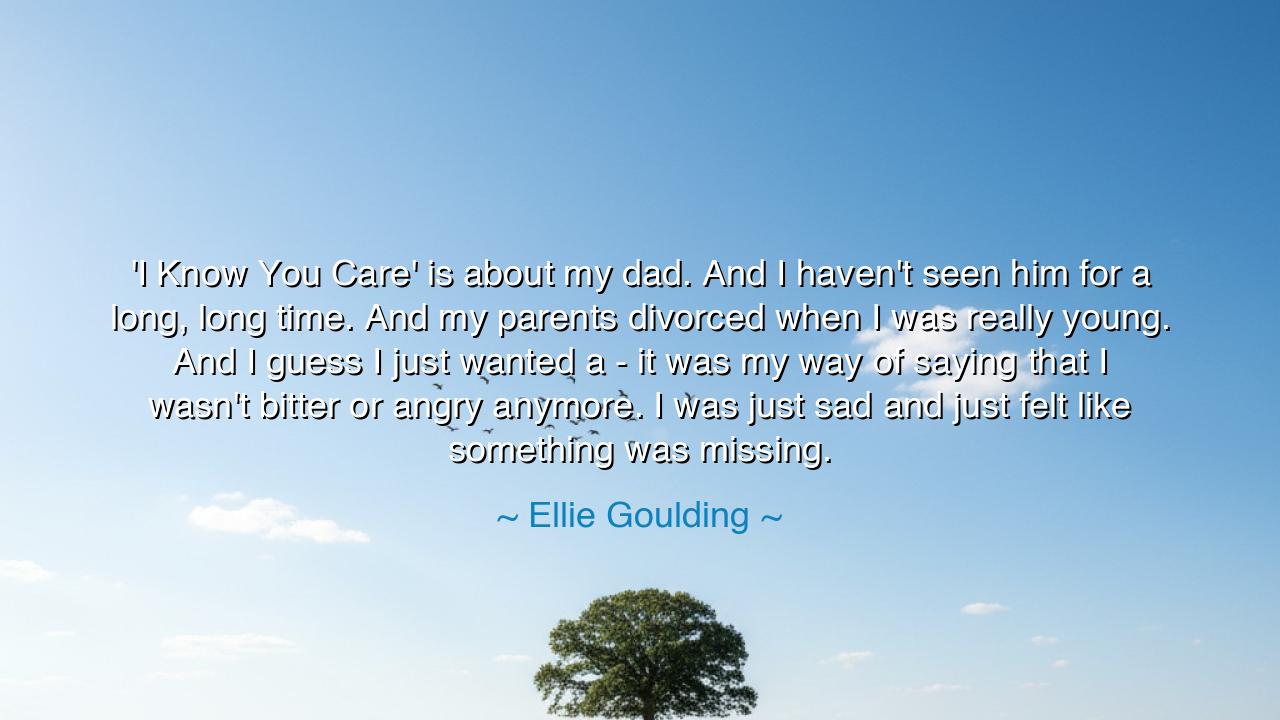
'I Know You Care' is about my dad. And I haven't seen him for a
'I Know You Care' is about my dad. And I haven't seen him for a long, long time. And my parents divorced when I was really young. And I guess I just wanted a - it was my way of saying that I wasn't bitter or angry anymore. I was just sad and just felt like something was missing.






Ellie Goulding once spoke with the fragile honesty of a heart no longer angry but still aching: “‘I Know You Care’ is about my dad. And I haven't seen him for a long, long time. And my parents divorced when I was really young. And I guess I just wanted a—it was my way of saying that I wasn't bitter or angry anymore. I was just sad and just felt like something was missing.” In these words, she reveals a truth that belongs not only to her but to all who have known separation, distance, and the quiet sorrow of unfinished love. It is the confession of one who has passed through the fire of resentment and emerged into the tender realm of acceptance. For beneath her sadness lies forgiveness, and beneath that forgiveness, an unspoken love that time itself could not extinguish.
In the ancient way of understanding, such a statement is a purification of the soul. When anger fades and sadness remains, it is a sign that the spirit has matured. Bitterness is the storm of youth, but sorrow is its aftermath—the still water in which reflection begins. Goulding’s song of her father is not an accusation but a remembrance. Through her art, she transforms pain into beauty, absence into melody. The ancients believed that music was the voice of emotion purified, the soul’s way of expressing what words cannot bear. In “I Know You Care,” Goulding does what every poet, every wounded heart must one day do—she takes grief and gives it form, so it may no longer destroy her from within.
Her story is as old as time. Across the ages, children have sung songs to their absent parents, and parents have waited for forgiveness they feared would never come. Consider the tale of Telemachus, the son of Odysseus. For years he grew up without his father, uncertain if the man was alive or dead. His life was defined by the echo of absence, the longing for a figure he could not recall. When Odysseus finally returned, the reunion was not triumphant, but tender—filled with tears more than joy. Like Goulding, Telemachus did not rage; he simply felt the weight of all that had been lost, all that might have been. Love that is interrupted by time does not die—it lingers, quietly demanding acknowledgment.
What makes Goulding’s reflection so powerful is her humility. She does not glorify her sadness nor disguise it. She admits that she felt “something was missing,” and in that simple admission lies the deepest wisdom. For many live their whole lives pretending the missing piece is gone, filling the void with noise and pride. But she, in speaking it aloud, restores dignity to sorrow. To feel the absence of love is to prove that one has loved truly. The sadness of the mature heart is not weakness—it is evidence of wholeness, of the capacity to still care even when love has not been returned in full.
Her words also carry a message of reconciliation—not outwardly, but inwardly. By saying she was no longer “bitter or angry,” Goulding shows that healing is not the same as reunion. One need not see the lost person again to forgive them; one need only release the chain that bitterness ties around the soul. The ancients called this catharsis—the cleansing that comes not from vengeance but from understanding. Forgiveness, they said, is not the gift we give others, but the one we give ourselves, for it frees us to walk forward unburdened.
There is also a profound spiritual truth here: that art can be the bridge between hearts separated by silence. Goulding, unable to speak to her father directly, spoke through song—the universal language of longing. Many before her have done the same. When the composer Gustav Mahler lost his child, he poured his grief into his Kindertotenlieder—songs for the dead children. He did not seek to erase the pain, but to make peace with it through creation. So too does Goulding turn her private ache into shared emotion, allowing others to find their own reflections within her melody. In that act, sorrow becomes service, and pain becomes purpose.
Thus, the lesson of Ellie Goulding’s confession is timeless: to transform loss into compassion, and sadness into understanding. We cannot choose what we lose, nor mend every bond broken by time. But we can choose how we carry those absences. We can let them harden us, or we can let them soften us. The wise learn, as she did, that healing is not the end of pain, but the transformation of it into gentleness. So if you, too, feel that something is missing, do not fill the space with noise. Sit with it, sing with it, let it teach you what it means to love. For in the end, the heart that has known both grief and forgiveness beats with a quieter, truer rhythm—the rhythm of peace.






AAdministratorAdministrator
Welcome, honored guests. Please leave a comment, we will respond soon